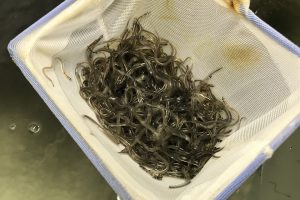Construction of a new 27,000-square-foot facility ‘a big moment for the growth’ for the company

American Unagi, an aquaculture company that cultivates and sells locally sourced, responsibly raised eels in the United States, has broken ground on Maine’s first land-based eel aquaculture facility.
“We’re building a very efficient facility,” said Sara Rademaker, American Unagi’s founder and president. “We’ve been thoughtful about our footprint and environmental impact, consulting with the fishing industry and Town of Waldoboro.”
Located in the Waldoboro Business Park, the new (U.S.) $10 million facility will be the first of its kind in the U.S. to grow Maine eels to market size. Using a recirculating aquaculture system (RAS) facility, the equipment was designed by ACE – a seasoned RAS design-build specialist based in the Netherlands.
“We chose ACE because of its commitment to innovation and efficiency,” Rademaker said. “They’ve assisted us in designing a farm that outperforms competing products and allows us to scale up to meet the strong demand for our eels.”
Originally scheduled for 2020, the COVID-19 pandemic stalled the construction of the 27,000-square-foot facility. But as of July 2021, “concrete is being poured and pipes are being laid,” paving the way for the company’s future. Once the new facility opens its doors, the company predicts that production will be boosted to more than 500,000 pounds – an estimated 5 percent of the U.S. eel market.
“This is a big moment for the growth of American Unagi,” said Rademaker.
Overall, the company seeks to address a pressing problem: specifically, that most eels bought by Americans are imported, which injects “a level of uncertainty” into the production process. In response, Rademaker founded American Unagi in 2014 to bring responsible eel cultivation to American soil.
https://www.aquaculturealliance.org/advocate/american-unagi-brings-eel-farming-back-home/
“Our goal has always been to create the most transparent and traceable product possible,” said Rademaker. “Our source of eels and method of production, which makes our eels popular with chefs and consumers alike, is unprecedented in the industry.”
The company sources its eels locally and raises them to market size without the use of hormones or antibiotics. It works exclusively with licensed Maine glass eel harvesters, which ensures that the eels are homegrown and adhere to state and federal regulations.
“There are two groups of people who touch our eels before they leave the farm: our fishing industry partners along Maine’s coast and our team at the farm, who grow the eels to size and then process them into easy-to-use butterflied fillets or ready-to-eat smoked eel,” said Rademaker.
Ultimately, the new facility will enable expanded partnerships with Maine’s glass eel harvesters, as well as spearhead 14 new jobs in the area. Looking long-term, U.S. Senator Susan Collins applauded the expansion, noting that “innovation and diversification in Maine’s aquaculture industry” will not only strengthen economic opportunities within the state but also confront sustainability challenges at the national level:
“By constructing the first land-based eel aquaculture facility in Maine, American Unagi is endeavoring to responsibly expand this critical sector of our economy while sustainably harvesting eels for consumers across the country,” Collins said.
Follow the Advocate on Twitter @GAA_Advocate
Now that you've finished reading the article ...
… we hope you’ll consider supporting our mission to document the evolution of the global aquaculture industry and share our vast network of contributors’ expansive knowledge every week.
By becoming a Global Seafood Alliance member, you’re ensuring that all of the pre-competitive work we do through member benefits, resources and events can continue. Individual membership costs just $50 a year. GSA individual and corporate members receive complimentary access to a series of GOAL virtual events beginning in April. Join now.
Not a GSA member? Join us.


